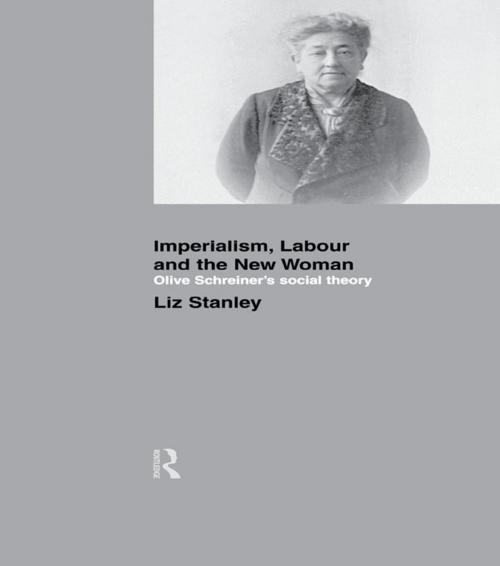Imperialism, Labour and the New Woman
Olive Schreiner's Social Theory
Nonfiction, Social & Cultural Studies, Social Science, Sociology| Author: | Liz Stanley | ISBN: | 9781134281770 |
| Publisher: | Taylor and Francis | Publication: | March 18, 2014 |
| Imprint: | Routledge | Language: | English |
| Author: | Liz Stanley |
| ISBN: | 9781134281770 |
| Publisher: | Taylor and Francis |
| Publication: | March 18, 2014 |
| Imprint: | Routledge |
| Language: | English |
Olive Schreiner (1855-1920) was the best-known feminist theorist and writer of her time. Her writings spanned a number of conventionally separate genres (including the novel, short story, allegory, political essay, polemic and theoretical treatise), which she crafted to produce a highly distinctive feminist and analytical 'voice'. A feminist who was contemporaneously an internationally-renowned social commentator, Schreiner's developing political analysis was - and still is - highly original. She developed a materially-based socialist and feminist analysis of 'labour' which led her to theorise social and economic change, divisions of labour in society and between women and men, capitalism and imperialism, around innovative ideas about how -- and by whom -- economic and social value was produced. She combined with this a keen attention to inter-personal relations, between women as literally or politically sisters, between 'respectable' and sexually outcast women, between feminist women and the 'New Men', and within the family. Distinctively, Schreiner's writings on economic and political life in South Africa criticised the policies and practice of Rhodes in the Cape Colony and British imperialism in southern Africa more widely. She opposed the South African War of 1899-1902, promoted federation rather than union as the form the South African state should take and insisted on equal political rights for all. Schreiner steadfastly opposed the development of apartheid segregationist policies and provided a radical analysis of the relationship between 'race' and capital.
Imperialism, Labour and the New Woman is based on primary archive research, making particular use of Schreiner's unpublished letters and other major manuscript sources to provide a major reconceptualisation of the scope and importance of her writings and innovative and experimental ideas about genre and form. It offers a major rethinking of Schreiner's political writings on South Africa, and it emphasises the distinctiveness of Schreiner's contribution as the major feminist theorist of her age and that which followed. The book will appeal particularly to readers interested in the development of social theory, in influential feminist ideas and writing of the fin de sicle period, in the contemporary critique of capitalism and imperialism, and in 'the age of imperialism' in Southern Africa, as well as to Women's Studies scholars across the academic disciplines.
Olive Schreiner (1855-1920) was the best-known feminist theorist and writer of her time. Her writings spanned a number of conventionally separate genres (including the novel, short story, allegory, political essay, polemic and theoretical treatise), which she crafted to produce a highly distinctive feminist and analytical 'voice'. A feminist who was contemporaneously an internationally-renowned social commentator, Schreiner's developing political analysis was - and still is - highly original. She developed a materially-based socialist and feminist analysis of 'labour' which led her to theorise social and economic change, divisions of labour in society and between women and men, capitalism and imperialism, around innovative ideas about how -- and by whom -- economic and social value was produced. She combined with this a keen attention to inter-personal relations, between women as literally or politically sisters, between 'respectable' and sexually outcast women, between feminist women and the 'New Men', and within the family. Distinctively, Schreiner's writings on economic and political life in South Africa criticised the policies and practice of Rhodes in the Cape Colony and British imperialism in southern Africa more widely. She opposed the South African War of 1899-1902, promoted federation rather than union as the form the South African state should take and insisted on equal political rights for all. Schreiner steadfastly opposed the development of apartheid segregationist policies and provided a radical analysis of the relationship between 'race' and capital.
Imperialism, Labour and the New Woman is based on primary archive research, making particular use of Schreiner's unpublished letters and other major manuscript sources to provide a major reconceptualisation of the scope and importance of her writings and innovative and experimental ideas about genre and form. It offers a major rethinking of Schreiner's political writings on South Africa, and it emphasises the distinctiveness of Schreiner's contribution as the major feminist theorist of her age and that which followed. The book will appeal particularly to readers interested in the development of social theory, in influential feminist ideas and writing of the fin de sicle period, in the contemporary critique of capitalism and imperialism, and in 'the age of imperialism' in Southern Africa, as well as to Women's Studies scholars across the academic disciplines.















